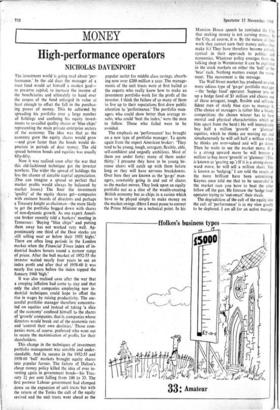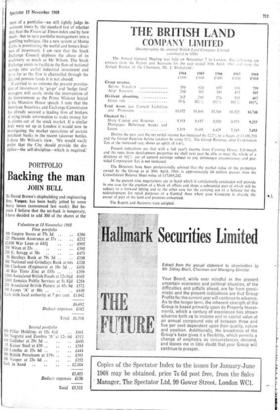High-performance operators
MONEY
NICHOLAS DAVENPORT
The investment world is going mad about `per- formance.' In the old days the manager of a trust fund would set himself a modest goal— to preserve capital, to increase the income of the beneficiaries and ultimately to hand over the corpus of the fund enlarged in value at least enough to offset the fall in the purchas- ing power of money. This he achieved by spreading his portfolio over a large number of holdings and confining his equity invest- ments to so-called quality shares or `blue chips' representing the main private enterprise sectors of the economy. The idea was that as the economy grew the equity shares would grow —and grow faster than the bonds would de- preciate in periods of dear money. The old spread between bonds and equities was usually fifty-fifty,
Now it was realised soon after the war that this old-fashioned technique got the investor nowhere. The wider the spread of holdings the less the chance of sizeable capital appreciation. One can imagine a spread so perfect that market profits would always be balanced by market losses.) The finer the investment `quality' of the equity shares get—companies with eminent boards of directors and perhaps a Treasury knight as chairman—the more likely to get the portfolio bogged down with shares of non-dynamic growth. As one expert Ameri- can broker recently told a bankers' meeting in Tennessee: 'Buying "blue chips" and putting them away has not worked very well. Ap- proximately one third of the Dow stocks are still selling near or below their 1955 highs.' There are often long periods in the London market when the Financial Times index of in- dustrial leaders hovers round a narrow range of prices. After the bull market of 1952-55 the investor waited nearly four years to see an index profit and after that of 1958-60 it was nearly five years before the index topped the January 1960 'high.
It was also realised soon after the war that a creeping inflation had come to stay and that only the alert companies employing new in- dustrial techniques could hope to offset the rise in wages by raising productivity. The suc- cessful portfolio manager therefore concentra- ted on equities and instead of taking `a slice of the economy' confined himself to the shares of `growth' companies, that is, companies whose directors would break out of the economic ruts and 'control their own destinies.' Those com- panies were, of course, preferred who went out to secure the maximisation of profits for their shareholders.
This change in the techniques of investment portfolio management was sensible and under- standable. And its success in the 1952-55 and 1958-60 'bull' markets brought equity shares into popular favour. The failure of Dalton's cheap money policy killed the idea of ever in- vesting again in government bonds—his Trea- sury 21 per cent falling from 100 to 33. The first postwar Labour government had clamped down on the expansion of unit trusts but with the return of the Tories the cult of the equity revived and the unit trusts went ahead as the popular outlet for middle class savings, absorb- ing now over f200 million a year. The manage- ments of the unit trusts were at first hailed as the experts who really knew how to make an investment portfolio work for the profit of the investor. I think the failure of so many of them to live up to their reputations first drew public attention to 'performance.' The portfolio man- agers who could show better than average re- sults, who could `beat the index,' were the men to follow. Those who failed were to be avoided.
The emphasis on `performance' has brought on a new type of portfolio manager. To quote again from the expert American broker: 'They tend to be young, tough, arrogant, flexible, able, self-confident and ungodly ambitious. Most of them are under forty; many of them under thirty.' I presume they have to be young be- cause ulcers will catch up with them before long or they will have nervous breakdowns. Over here they are known as the `go-go' man- agers, constantly going in and out of shares as the market moves. They look upon an equity portfolio not as a slice of the wealth-creating British economy but as chips in a casino which have to be played simply to make money on the market swings. (Here I must pause to correct the Prime Minister on a technical point. In his
Mansion House speech he reminded the Cite that making money is not earning money. In the City, of course, it is. By the nature of their work they cannot earn their money unless they make it.) They have therefore become entirely cynical in their approach to politics and economics. Whatever policy emerges from the talking shop in Westminster it can be exploited in the stock markets on either the 'bull' or the `bear' tack. Nothing matters except the move. ment. The movement is the message.
The Wall Street market has produced an even more odious type of `go-go' portfolio manager —the 'hedge fund' operator. Suppose you set up a hedge fund of $1 million and choose one of those arrogant, tough, flexible and self-con- fident men of steely, blue eyes to manage it. (The choice of managers is rather like a beauty competition; the chosen winner has to have mental and physical characteristics which set him apart from the herd.) He will immediately buy half a million 'growth' or 'glamour' equities, which he thinks are moving up; and simultaneously he will sell half a million which he thinks are over-valued and will go down. Then he waits to see the market move. If it is a strong upward move he will borrow a million to buy more 'growth' or 'glamour.' (This is known as 'gearing up.') If it is a strong down- ward move, he will sell a million short. This is known as 'hedging.' I am told the results of the more brilliant have been astonishing. Keynes once told me that to be successful in the market race you have to beat the other fellow off the gun. He foresaw the 'hedge fund' operator trying to 'out-smart' their rivals.
The degradation of the cult of the equity into the cult of `performance' is in, my view greatly to be deplored. I am all for an active manage- ment of a portfolio--we still rightly judge in- vestment trusts by the' standard test of whether they beat the Financial Times index and by how much—but to turn portfolio management into a gambling technique, like a new system at Monte Carlo, is prostituting the useful and honest busi- ness of investment. I am sure that the Stock Exchange Council deplores the abuse of its machinery as much as Mr Wilson. The Stock Exchange exists to facilitate the flow of national savings into useful industrial investment and in so far as the flow is channelled through the life and pension funds it is not abused.
If carried to an extreme the present prostitu- tion of investment by 'go-go' and 'hedge fund' managers will surely invite the intervention of the Government as the Prime Minister hinted in his Mansion House speech. I note that the American Securities and Exchange Commission has already accused a leading firm of brokers of using inside information to make money for its clients out of the stock market. If a similar body were set up in London it would now be investigating the market operations of certain merchant banks in the recent takeover battles. I share Mr Wilson's view: 'We would vastly prefer that the City should provide the dis- cipline—the self-discipline—which is required.'







































 Previous page
Previous page